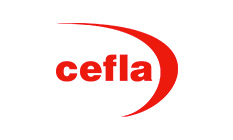
CHOOSE A GOAL, REACH BOTH TARGETS.
PRESENT AND FUTURE OF THE ENERGY TRANSITION.
The scenario
The European climate law has turned achieving the climate protection goal of reducing the European Union’s emissions by at least 55% by 2030 into a legal obligation.
The countries concerned are working to produce a new legislation aimed at achieving this goal and making the EU climate-neutral by 2050.
Italy has also joined a European program with decarbonization objectives to be achieved by 2030, signing the Paris agreements, including goals on reducing the amount of CO2 tonnes emitted, thus helping to avoid temperature increases.
The goal
Cefla aims to encourage an active debate on issues regarding decarbonization, in order to reduce our carbon footprint and the resulting harmful emissions into the atmosphere. The first step in this direction is to help businesses and large infrastructures to generate efficiency.
Energy production and use account for more than 75% of the EU’s greenhouse gas emissions.
Energy system decarbonization within the EU is therefore key to achieving the climate protection objectives of the 2030 agenda and to implementing the EU’s long-term strategy aiming to achieve carbon neutrality by 2050.
The solutions
To reduce greenhouse gas emissions, finding the right balance among different technologies seems the right choice to make – as the winning configuration, both nationally and at small- and medium-sized business level, is a mix of resources including photovoltaic, cogeneration, heat pumps, fuel replacement with the introduction of hydrogen etc.

WHAT IS YOUR COMPANY’S PRIORITY?

TO MAKE IT EFFICIENT
Whether your goal is reducing your factory’s methane consumption to zero or achieving a level of energy efficiency such as to cut management or production costs, the pathway that you will follow, hand in hand with Cefla, is designed to achieve both goals.
Cefla supports customers who need to improve the performance of their facilities – in terms of both energy and process efficiency.

DECARBONIZE
The pathway
We will start from an analysis aimed at determining the ideal technological mix that would allow energy efficiency improvements to be achieved at both management and production process level.
A variety of technologies can be implemented – whose individual value is magnified by their coordination with others in order to generate even greater benefits.
By improving efficiency, emissions are automatically reduced which means that we are, in actual fact, decarbonizing.
The pathway to decarbonization requires a considerable level of commitment but is at the same time a great opportunity. We will walk side by side with you along that path, from analysis all the way to implementation, to make it twice as rewarding.
Energy efficiency and decarbonization are closely linked goals.
CEFLA, YOUR ENERGY TRANSITION PARTNER.
Cefla is first and foremost a consultant, with over 90 years of experience in plant engineering: it can combine analysis expertise with the professionalism and experience acquired over so many years in the field.
Today, we can partner you on the path that will lead you to improved efficiency as well as to achieving your decarbonization objectives.
We are unique in that we not only support customers in the analysis phase but also, and most importantly, partner them during the implementation and subsequent management phases – having always been plant engineers.
Read the Angelini Pharma case history
OUR SKILLS
Our business-specific experience allows us to carry out all-round analyses of energy production systems.
We make the best use of our engineering skills to integrate different technologies, not only in the analysis phase but most importantly throughout the implementation steps. We are unique in that we provide our customers with solutions suitable for on-site implementation – in other words, solutions that are sustainable in both scheduling and financial terms.
We are there for you – to respond to your daily needs. We adopt the same approach to Global Service activities. Together with our customers, we analyse critical issues and develop new solutions, generating energy efficiency, financial savings and making production more sustainable.
NOVA and fuel cell cogeneration
Fuel cells convert the chemical energy of fuels - natural gas, biogas, biomethane or hydrogen - into electricity and heat, but without any combustion taking place unlike in traditional cogeneration. This translates into virtually no harmful emissions into the atmosphere.
The greater efficiency of this kind of system compared to systems based on internal combustion engines or turbines helps to reach decarbonization goals as more energy is produced while enhancing electrical efficiency. Power remaining equal, electrical efficiency is 20% higher, and CO2 emissions are significantly reduced.


